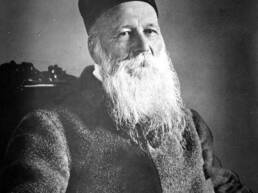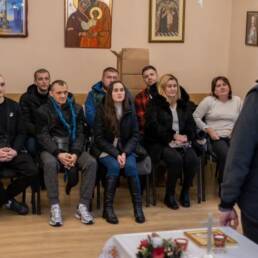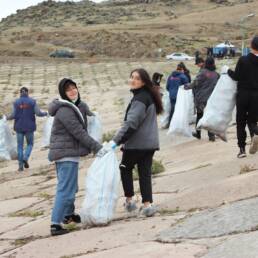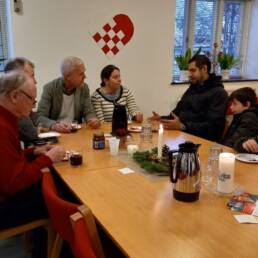Author
Hugo Slim
Senior Research Fellow
Las Casas Institute for Social Justice
Blackfriars Hall, University of Oxford
This article is an edited version of a talk given to the staff of Caritas Germany in Freiburg in February 2023.
Neutrality in Ethics
As human beings, we are called to assess, judge and act as moral beings. Once we have eaten of the tree of the knowledge of good and evil, we have no choice but to be active in our moral and political lives, and a big part of this turns on deciding what is right and wrong, and who is right and wrong.
Neutrality is treated with significant suspicion in ethics. It is an ambivalent position – a vice more often than a virtue. Neutrality which is evasive and cowardly is not a deep human value for which we should always strive. It is understandable, then, that humanitarian organisations should have a certain ambivalence about neutrality: that neutrality is mostly wrong but can be right – if pursued in a good enough cause.
Because of its intrinsic moral ambivalence, neutrality is the humanitarian principle which causes the most moral stress amongst aid workers. And it is right that it should. It is always a moral risk to be neutral.

While politically innate to Swiss humanitarians who have done most to formalise the principle in modern international relations, neutrality is not so
natural for the rest of us. For most of us, neutrality seems politically disingenuous at best, and more like bystanding, self-preservation and moral cowardice at worst. As such, we can say, having ambivalence about neutrality is ethically healthy. Neutrality is a moral stance of which we should be wary and suspicious. We know it is not usually right to abstain from taking a stand on matters of justice.
This means, I think, that those who take a neutral position have a triple obligation. First, they have a duty to show why it is the right thing to do in a particular situation.
Second, neutrals have a duty to show that the moral objective they are pursuing with neutrality is significant enough to justify this ethical exception.
Third, neutrals have a duty to show that their neutrality does not become a wickedly useful resource for various parties in their pursuit of immoral goals.
In ethical jargon, therefore, neutrality is not an obvious virtue but is recognised as a particular “role responsibility” similar to the role responsibility of a football referee, a judge or a marriage counsellor. Taking on a role responsibility means I suspend rather than abandon my moral self. In this context of a wider moral importance of some professional roles, it is right, I think, to see neutrality as predominantly a vice but occasionally a virtue.
Jesus and neutrality
What, then, can be said of Jesus’ approach to neutrality?
Jesus was occasionally neutral but, more often, he was not neutral at all. He was sometimes neutral about the Roman empire – render to Caesar that which is Caesar’s and render to God that which is God’s – but also dismissive of Roman power as earthly and imperfect.
He was highly critical and non-neutral about the Jewish establishment, confronting, criticising, cursing the Pharisees as wicked hypocrites and oppressors.
But sometimes he was also secretive and disguised his challenge to Jewish leaders – “don’t tell anyone” – wanting to hide his power and challenge for the moment. During his ministry, he practiced a mixture of tactical neutrality, determined non-neutrality and disguised confrontation. (Cf. Mt, 22:21, Mt, 23, Mt 8, etc.)
Finally, of course, Jesus was executed by a combination of two political establishments – Roman and Jewish – suggesting that both saw him as a political threat and not neutral.
As such, we can perhaps characterise Jesus’ approach as sometimes neutral/mostly not/ultimately politically challenging. Jesus’ active and flexible approach to neutrality operates along a moral spectrum. It is totally different to Pilate’s passive neutralism – completely washing his hands of a political choice and refusing any part in an urgent moral choice.
Importantly, Jesus’ non-neutral and judgmental political approach to institutions is always accompanied by his impartial and compassionate approach towards individuals. This is important for humanitarians. Jesus shows us how we can be politically critical, not neutral, while also being personally humane and caring. We can be non-neutral humanitarians.
The Humanitarian Tradition
In the humanitarian tradition, neutrality is an exceptional position that is adopted for an obvious moral purpose. It is a form of active neutrality in pursuit of something good.
In some conflicts, neutrality works to an extent. But neutrality is never a golden pass to every area, every prison, every need. This is important because it means that neutral humanitarianism can seldom justify itself purely on the basis of success. Neutrality does not have a distinct and automatic moral advantage because it works, because it often does not work.
Many Caritas people around the world are not politically neutral but they are excellent humanitarians. They share Jesus’ combined concern for political criticism grounded in justice and humanitarian care grounded in compassion. So, in my view, neutrality is an option in humanitarian action not an obligation. It is very good that there are some neutral humanitarians because sometimes this enables greater humanitarian access and coverage. My own experience of neutral humanitarianism tells me that it can add significant value.
However, I do not think neutrality is a humanitarian requirement. You can be humanitarian without being neutral. This is true as a politically motivated government fighting for survival, like the Ukrainian government today. And it is true for politically motivated resistance movements fighting against dictatorship, as in Myanmar, or political gangs fighting on the streets of Nigeria or Guatemala.
It is much better, I think, that we use the word humanitarian more generously and recognise non-neutral and non-independent humanitarian action as equally “principled” for being grounded in the values of humanity, impartiality and International Humanitarian Law. We need not confine the humanitarian label to these organisational creatures called “principled humanitarians” – which is code for accepting the four Red Cross principles of humanity, impartiality, neutrality and independence. I do not think the last two principles – neutrality and independence – are required in humanitarian action.
From this it makes better sense to mark out humanitarian neutrals as “neutral humanitarian agencies” rather than “principled humanitarian agencies”. All humanitarian actors are “principled” whether they are neutral or not. Often, non-neutral humanitarians, such as government ministries and politically positioned NGOs and community groups, provide the majority of humanitarian resources. Such organisations are required to be humane and impartial but not neutral and independent.

How to approach neutrality as Caritas?
As Catholic agencies, we are required to imitate Jesus above all. Catherine of Sienna recalls how Jesus asked her in one of her visions “to be another me”. This is what we should all be trying to do as humanitarian workers. Drawing on Jesus’ rich example of divinity negotiating human sin, injustice and its many political entanglements.
However, the crucifixion must be an example too. Ultimately, Jesus’ commitment to a loving God was deemed extremely political by all parties and they killed him, as he knew they would. A state of permanent neutrality, endless prudence and total secrecy is ultimately not an option for Christians.
Deliberate well
As organisations, deliberation is a very important part of our moral responsibility. It shows that we are giving a serious problem the attention it deserves. Deliberating well means doing it with others. This means involving the people most affected as well as people of knowledge and understanding, and some who stand apart and have a more detached perspective. Good deliberation should take time, but it should also come to a conclusion and not endlessly delay and defer.
There is a story about St Conrad having to swallow a poisonous spider which has fallen into the consecrated wine at Mass one day. He cannot throw away the wine so he must endure the spider. This parable speaks to us about the challenge around neutrality today. Somehow, like Conrad, no matter how much we surround our work with principles and goodness, we will still have to swallow the spider of political poison whenever we work in the middle of human conflict and evil. We cannot avoid it.
Neutrality may protect you sometimes. Prudence and secrecy may protect you sometimes. But much of the time, you will have to be political and speak about justice and goodness, right and wrong. You will have to be courageous and swallow a mixed cup of human poison and God’s love. And you may choke on it as you are required to swallow and digest great goodness and great evil at the same time in the same place.
But, like Conrad, being Christian organisations, we believe that God’s love will prove greater than human hate, and this love will always be with us, resurrecting itself again and again in human affairs.












